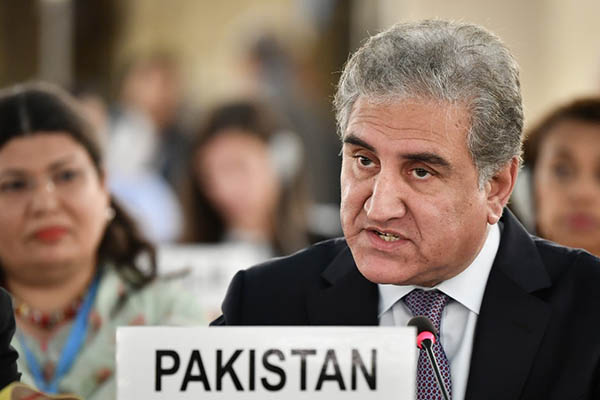
File photo. Fabrice Coffrini—AFP
Pakistan’s foreign minister reiterates claims of Indian aggression posing threat to regional security
The Organization for Islamic Cooperation (OIC) should launch a global campaign to outlaw “willful provocation” against Muslims and incitement to hate, Pakistan’s foreign minister said on Friday.
Addressing the 47th session of the OIC Council of Foreign Ministers in Niger, Shah Mehmood Qureshi lamented that Islamophobia was on the rise in the West. “Recent despicable incidents like desecration of the holy Quran and reprinting of caricatures of Islam’s Prophet have seriously hurt the sentiments of over 1.8 billion Muslims around the world,” he said. “These shameful acts cannot and should not be justified in the name of freedom of expression,” he added.
The foreign minister said Islamophobia enabled a hostile environment for Muslims and urged the OIC to raise awareness about its effect. “Pakistan has always played the lead role in combating Islamophobia, and will continue to do so,” he said, and proposed March 15 as an “International Day to Combat Islamophobia.”
Jammu and Kashmir
Referring to India, Qureshi said India’s Hindutva-led government posed a “serious threat” to both Indian Muslims, as well as regional security. “The Modi government is systematically attacking the country’s over-180 million Muslims,” he warned, noting mob lynchings and discriminatory laws were just some of the examples of the abuses being perpetrated.
He noted that Indian P.M. Narendra Modi had, on Aug. 5, 2020, violated OIC resolutions by laying the foundation stone of a Hindu temple on the site of the Babri Mosque. “We must take cognizance of these crimes lest we see another bloodbath of Indian Muslims,” he warned, adding that the situation in India-held Kashmir was particularly dire.
“In the backdrop of India’s illegal and unilateral actions of Aug. 5, 2019, IIOJK [Indian Illegally Occupied Jammu and Kashmir] has turned into a grave human and humanitarian tragedy,” he said, noting that Kashmiris had been under lockdowns, communications blockades and arbitrary detentions for over 15 months now. “The entire occupied territory has turned into the world’s largest open air prison,” he said, reiterating that Delhi’s efforts to change the demographic structure of region were a clear violation of UNSC resolutions and international law, in particular the 4th Geneva Convention.
“International human rights organizations, media, parliaments and civil society organizations the world over are condemning India,” he said, noting that the only viable solution was one in line with the relevant UNSC Resolutions and the wishes of the Kashmiri people. “The RSS-BJP regime in India, however, refuses to respond to these appeals,” he said.
Accusing India of fomenting cross-border terrorism against Pakistan to distract global attentions from its crime, the foreign minister alleged that Delhi had committed numerous violations of the 2003 ceasefire understanding along the Line of Control, deliberately targeting the civilian population, and testing Pakistan’s patience. “While Pakistan has been at the forefront of fighting the menace of terrorism, India has been weaving a web of terrorism in Pakistan,” he said, referring to a dossier that the government has compiled as “incontrovertible proof” of India’s actions. “We hope that the OIC collectively, and Muslim countries individually, will play a role in stopping India from following this dangerous course,” he added.
The foreign minister also appreciated the OIC’s highlighting of the Kashmir dispute, saying the “beleaguered people” of the region were looking toward the OIC and the Ummah to help alleviate their sufferings.
Coronavirus
Referring to the global COVID-19 pandemic, Qureshi said the world needed to come together to counter the threat. “Pakistan has been able to contain the worst effects of the pandemic,” he said, but warned that the second wave was now “hitting us all.” He said Islamabad was willing to share its experience with other Muslim countries.
Foreign affairs
The foreign minister reiterated Pakistan’s abiding commitment to the Palestinian people, saying this was essential to a lasting peace. He also discussed the Afghanistan peace process, noting that after Kabul, Islamabad had suffered the most from the war on terror. “We continue to fully support the Afghan peace and reconciliation process, and hope that our collective endeavors will result in a peaceful, stable and prosperous Afghanistan,” he added.
He also reaffirmed Pakistan’s support for the resolution of the Nagorno Karabagh dispute in accordance with international law and relevant UNSC resolutions, and Islamabad’s full solidarity and support for the aspirations and endeavors of African nations for peace, progress and prosperity.
